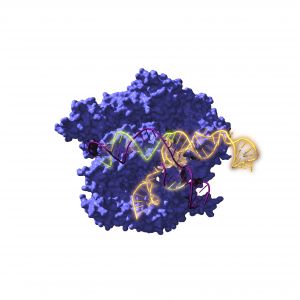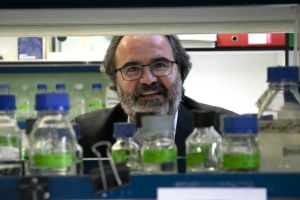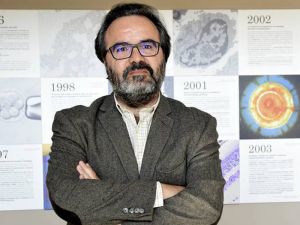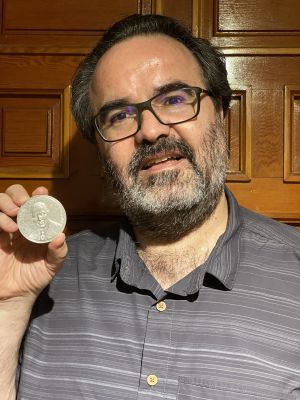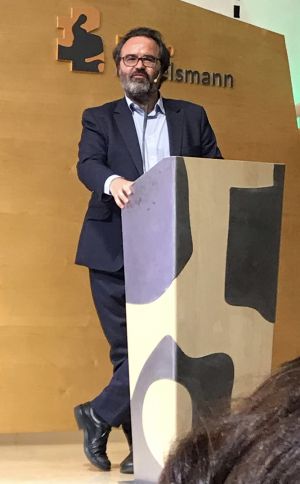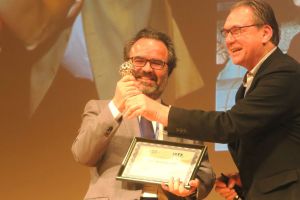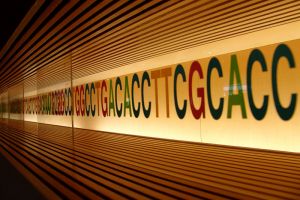La Fundación Lilly incorpora a Lluís Montoliu, investigador del CNB-CSIC, a su Consejo Científico, y destaca, entre otros aspectos, su gran experiencia colaborando con asociaciones de pacientes. Esta faceta aportará puntos de vista complementarios, tanto científicos como humanistas, a los temas que se debaten habitualmente en el consejo asesor de la Fundación. Con la incorporación de Montoliu son 14 las personalidades que forman parte del Consejo Científico presidido por Mariano Barbacid.
Entre los objetivos de la Fundación Lilly destaca el fomento de la ciencia, el impulso la medicina y la promoción de los valores del humanismo científico.
- Un estudio internacional liderado por científicos españoles descifra el origen de la herramienta de edición genética CRISPR y constata su actividad original
- El trabajo, publicado en la prestigiosa revista científica Nature Microbiology, abre nuevas vías en la manipulación de ADN y en el tratamiento de enfermedades como el cáncer o la diabetes
Un grupo de investigación internacional ha reconstruido por primera vez ancestros del conocido sistema CRISPR-Cas de hace 2.600 millones de años y ha estudiado su evolución a lo largo del tiempo. Los resultados apuntan a que los sistemas revitalizados no solo funcionan, sino que son más versátiles que las versiones actuales y podrían tener aplicaciones revolucionarias. La prestigiosa revista científica Nature Microbiology ha dado a conocer los resultados de esta investigación que, en opinión del equipo investigador “abre nuevas vías para la edición genética”.
En el proyecto, dirigido por el investigador Ikerbasque de CIC nanoGUNE Rául Pérez-Jiménez, participan equipos del Consejo Superior de Investigaciones Científicas como el de Lluís Montoliu en el Centro Nacional de Biotecnología, la Universidad de Alicante, el Centro de Investigación Biomédica en Red de Enfermedades Raras (CIBERER), el Hospital Ramón y Cajal-IRYCIS y otras instituciones estatales e internacionales.
Lluís Montoliu, investigador del CNB-CSIC, recibe hoy el Premio COSCE a la Difusión de la Ciencia 2022, otorgado por la Confederación de Sociedades Científicas Españolas (COSCE) con la colaboración de la Fundación Ramón Areces.
El biotecnólogo y genetista Lluís Montoliu, del Centro Nacional de Biotecnología (CNB-CSIC), es el nuevo presidente del Comité de Ética del Consejo Superior de Investigaciones Científicas (CSIC). El nuevo comité tendrá como vicepresidenta a la investigadora Carme Torras, matemática experta en inteligencia artificial y robótica del Instituto de Robótica e Informática Industrial (IRI-CSIC-UPC) de Barcelona. Montoliu y Torra toman el relevo del biólogo molecular Miguel García Guerrero, del Instituto de Bioquímica Vegetal y Fotosíntesis (IBVF-CSIC) y del microbiólogo Rafael Giraldo (CNB-CSIC). El CSIC da las gracias al equipo saliente por su labor a lo largo de los años, y da la bienvenida a la nueva presidencia.
This award from the European Society for Pigment Cell Research (ESPCR) and the International Federation of Pigment Cell Societies (IFPCS) aims to recognize the contribution of international researchers in the field of genetic conditions related to pigmentation.
Lluís Montoliu, CNB-CSIC and CIBERER researcher, received this year the medal for his “key efforts to use animal transgenics to investigate albinism. He has also been an untiring champion for people with albinism and is working on developing tools for improved diagnosis of albinism
Montoliu appreciated the recognition “it is a great honor to be awarded the HS Raper Medal remembering the memory of Henry Stanley Raper, a prestigious US biochemist best known for his pioneer work on the metabolism of fat and the formation of melanin.
Due to the cancellation of the International Pigmentation Congress that was to be held in Japan these days, the award ceremony had to be canceled, but the medal has already reached its recipient.
Lluís Montoliu, researcher at the CNB, has received one of the Antama Foundation Prizes in Science Dissemination. These prizes aim to recognise the role of journalists, scientists and initiatives that have contributed rigorously to the communication of science.
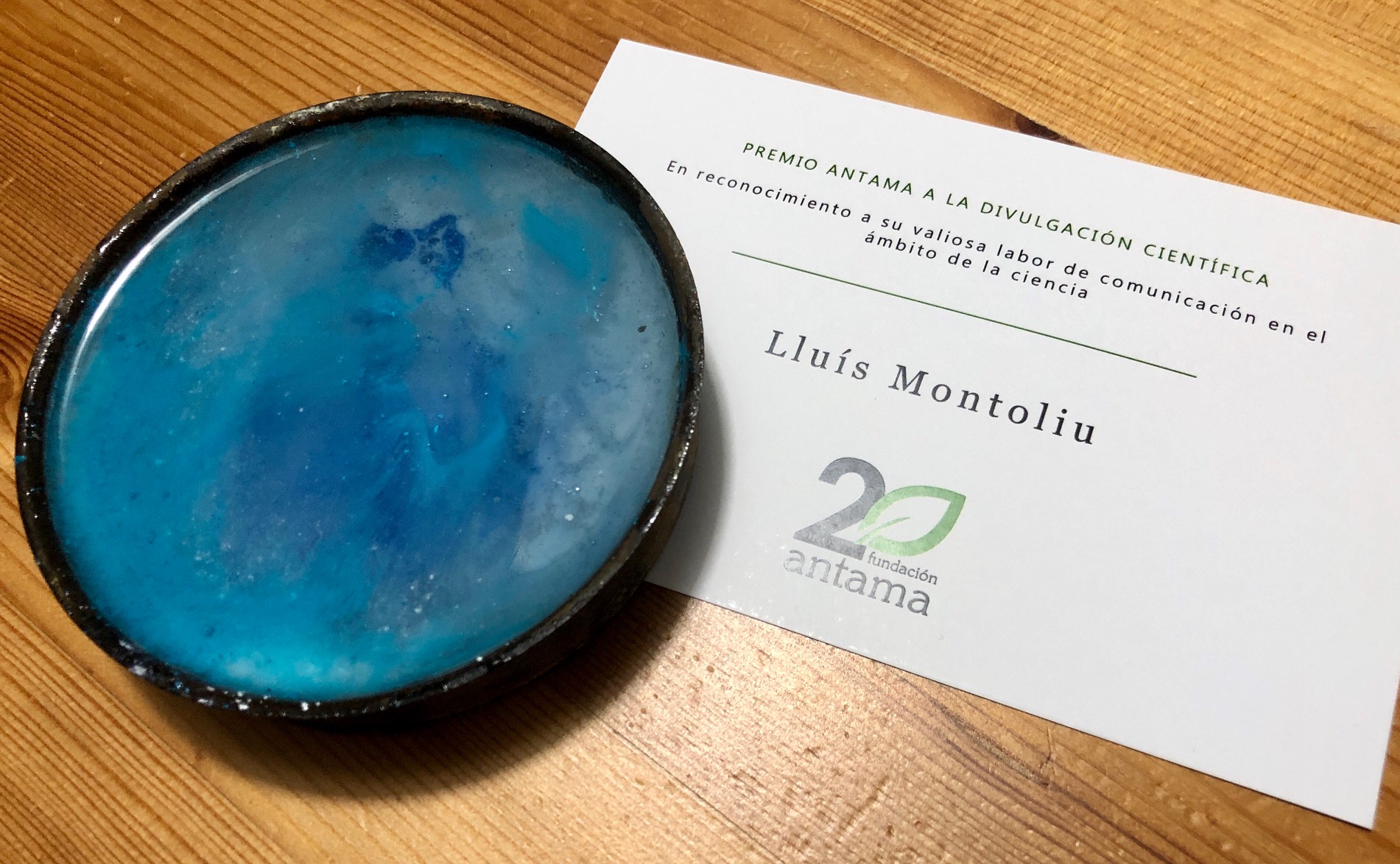
During the award ceremony, held the 5th of November in Madrid, Lluís Montoliu remarked that “we live an exciting time of continuous scientific and technological advances. Many of these biotechnology advances improve our quality of life, have a direct impact in how we can prevent and find cure for diseases, an optimal and sustainable use of the environment or improvements in animal and plant production necessary to meet the feeding needs of people and animals. ”
The Antama Foundation also recognised the work of Naukas, Maldita ciencia, Big Van Ciencia, Hipertextual, José Miguel Mulet, Álvaro Bayón, José Manuel López Nicolás, Rocío Vidal, Aitor Gálvez, Daniel García, Rosa Porcel, Sandra Ortonoves and Jorge Alcalde.
Francis Mojica, who discovered the potential of CRISPR tools, received an Honorary Award in "recognition of his decisive contribution to the advancement of genetic editing."
Dr. Lluis Montoliu has received this week in Japan the 12th ISTT Prize from The International Society for Transgenic Technologies (ISTT). The ISTT Prize is awarded to investigators who have made outstanding contributions to the field of transgenic technologies. The Award Committee recognised not only his seminal work on YAC transgenesis but also his efforts to develop and establish the ISTT, an organization now counting with more than 700 members worldwide where Dr. Montoliu served as the first President from 2006 to 2014.
Experts from across the continent recommend establishment of a European committee to review and evaluate the uses of new genetic tools. The new techniques are inexpensive, simple, rapid and have greatly expanded the range of potential applications; they are also moving millions of euros. Scientists consider it is time to launch a debate on the ethical and social implications of these tools, and to legislate their use and applicability.
3 million Spaniards suffer from one of the diseases classified as rare. Albinism is one of these and affects 1 in every 17,000 inhabitants. At the Centro Nacional de Biotecnología (CNB-CSIC), Lluis Montoliu’s laboratory seeks to broaden our knowledge of this disease to improve diagnosis and find customized therapies for these patients. The CNB-CSIC joins the celebration of this day to promote understanding and social awareness of these diseases.
Curr Protoc Hum Genet. 2014; 83:15.7.1-15.7.27.
Harms DW, Quadros RM, Seruggia D, Ohtsuka M, Takahashi G, Montoliu L, Gurumurthy CB.
 The availability of techniques to create desired genetic mutations has enabled the laboratory mouse as an extensively used model organism in biomedical research including human genetics. A new addition to this existing technical repertoire is the CRISPR/Cas system. Specifically, this system allows editing of the mouse genome much more quickly than the previously used techniques, and, more importantly, multiple mutations can be created in a single experiment.
The availability of techniques to create desired genetic mutations has enabled the laboratory mouse as an extensively used model organism in biomedical research including human genetics. A new addition to this existing technical repertoire is the CRISPR/Cas system. Specifically, this system allows editing of the mouse genome much more quickly than the previously used techniques, and, more importantly, multiple mutations can be created in a single experiment.
Here we provide protocols for preparation of CRISPR/Cas reagents and microinjection into one-cell mouse embryos to create knockout or knock-in mouse models.
COOKIES POLICY
A cookie is a text file that is stored on your computer or mobile device via a web server and only that server will be able to retrieve or read the contents of the cookie and allow the Web site remember browser preferences and navigate efficiently. Cookies make the interaction between the user and the website faster and easier.
General information
This Website uses cookies. Cookies are small text files generated by the web pages you visit, which contain the session data that can be useful later in the website. In this way this Web remembers information about your visit, which can facilitate your next visit and make the website more useful.
How do cookies?
Cookies can only store text, usually always anonymous and encrypted. No personal information is ever stored in a cookie, or can be associated with identified or identifiable person.
The data allow this website to keep your information between the pages, and also to discuss how to interact with the website. Cookies are safe because they can only store information that is put there by the browser, which is information the user entered in the browser or included in the page request. You can not run the code and can not be used to access your computer. If a website encrypts cookie data, only the website can read the information.
What types of cookies used?
The cookies used by this website can be distinguished by the following criteria:
1. Types of cookies as the entity that manages:
Depending on who the entity operating the computer or domain where cookies are sent and treat the data obtained, we can distinguish:
- Own cookies: are those that are sent to the user's terminal equipment from a computer or domain managed by the editor itself and from which provides the service requested by the user.
- Third party cookies: these are those that are sent to the user's terminal equipment from a machine or domain that is not managed by the publisher, but by another entity data is obtained through cookies.
In the event that the cookies are installed from a computer or domain managed by the editor itself but the information collected by these is managed by a third party can not be considered as party cookies.
2. Types of cookies as the length of time that remain active:
Depending on the length of time that remain active in the terminal equipment can be distinguished:
- Session cookies: cookies are a type designed to collect and store data while the user accesses a web page. Are usually used to store information that only worth preserving for the service requested by the user at any one time (eg a list of products purchased).
- Persistent cookies: cookies are a type of data which are stored in the terminal and can be accessed and treated for a period defined by the head of the cookie, and can range from a few minutes to several years.
3. Cookies types according to their purpose:
Depending on the purpose for which the data are processed through cookies, we can distinguish between:
- Technical cookies: these are those that allow the user to navigate through a web page or application platform and the use of different options or services it exist as, for example, control traffic and data communication, identify the session, access to restricted access parts, remember the elements of an order, make the buying process an order, make an application for registration or participation in an event, use security features while browsing store content for dissemination videos or sound or share content via social networks.
- Customization cookies: these are those that allow the user to access the service with some general characteristics based on a predefined set of criteria in the user terminal would eg language, the type of browser through which you access the service, the locale from which you access the service, etc.
- Analysis cookies: they are those that allow the responsible for them, monitoring and analyzing the behavior of users of the web sites that are linked. The information gathered through such cookies are used in measuring the activity of web sites, application or platform and for the profiling of user navigation of such sites, applications and platforms, in order to make improvements function data analysis how users use the service.
Management tool cookies
This Website uses Google Analytics.
Google Analytics is a free tool from Google that primarily allows website owners know how users interact with your website. Also, enable cookies in the domain of the site in which you are and uses a set of cookies called "__utma" and "__utmz" to collect information anonymously and reporting of website trends without identifying individual users..
For statistics of use of this website use cookies in order to know the level of recurrence of our visitors and more interesting content. This way we can concentrate our efforts on improving the most visited areas and make the user more easily find what they are looking for. On this site you can use the information from your visit for statistical evaluations and calculations anonymous data and to ensure the continuity of service or to make improvements to their websites. For more details, see the link below privacy policy [http://www.google.com/intl/en/policies/privacy/]
How to manage cookies on your computer: disabling and deleting cookies
All Internet browsers allow you to limit the behavior of a cookie or disable cookies within settings or browser settings. The steps for doing so are different for each browser, you can find instructions in the help menu of your browser.
If you decline the use of cookies, since it is possible thanks to the preferences menu of your browser or settings, reject, this website will continue to function properly without the use of the same.
Can you allow, block or delete cookies installed on your computer by setting your browser options installed on your computer:
- For more information about Internet Explorer click here.
- For more information on Chrome click here.
- For more information about Safari click here.
- For more information about Firefox click here.
Through your browser, you can also view the cookies that are on your computer, and delete them as you see fit. Cookies are text files, you can open and read the contents. The data within them is almost always encrypted with a numeric key corresponding to an Internet session so often has no meaning beyond the website who wrote it.
Informed consent
The use of this website on the other hand, implies that you paid your specific consent to the use of cookies, on the terms and conditions provided in this Cookies Policy, without prejudice to the measures of deactivation and removal of cookies that you can take, and mentioned in the previous section.


